必修五 unit1 Great scientists Using language (2)
文档属性
| 名称 | 必修五 unit1 Great scientists Using language (2) |
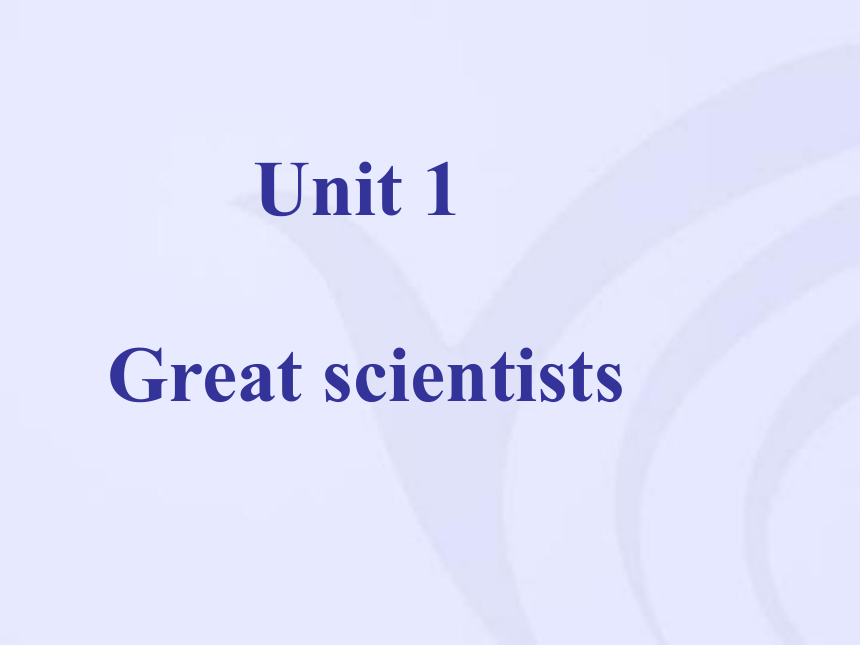
|
|
| 格式 | rar | ||
| 文件大小 | 1.5MB | ||
| 资源类型 | 教案 | ||
| 版本资源 | 人教版(新课程标准) | ||
| 科目 | 英语 | ||
| 更新时间 | 2011-08-19 00:00:00 | ||
图片预览



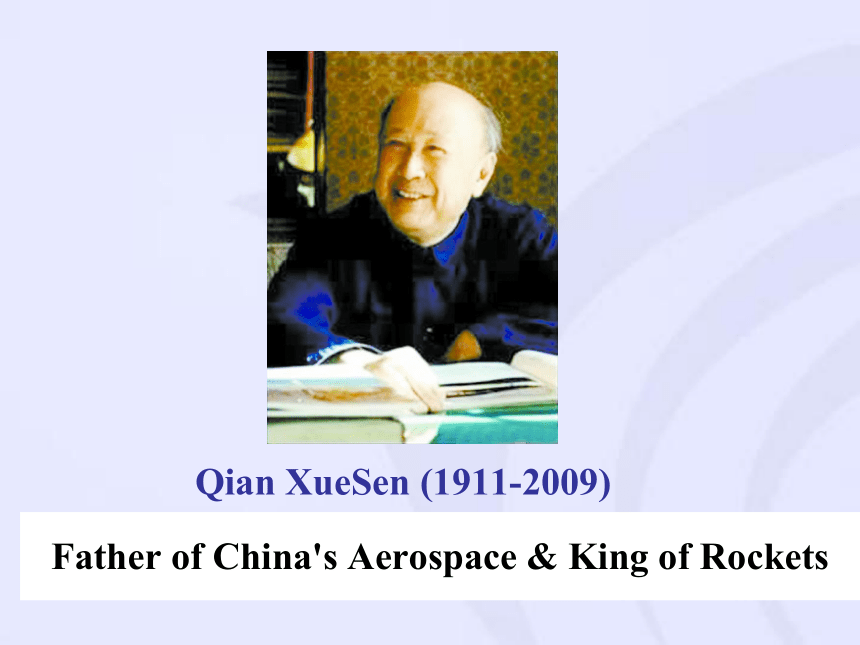
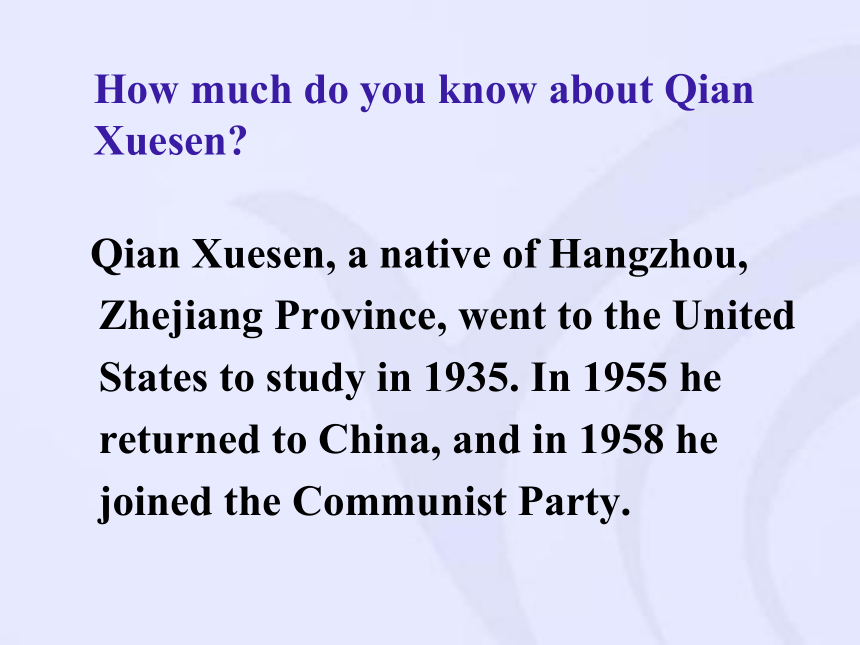
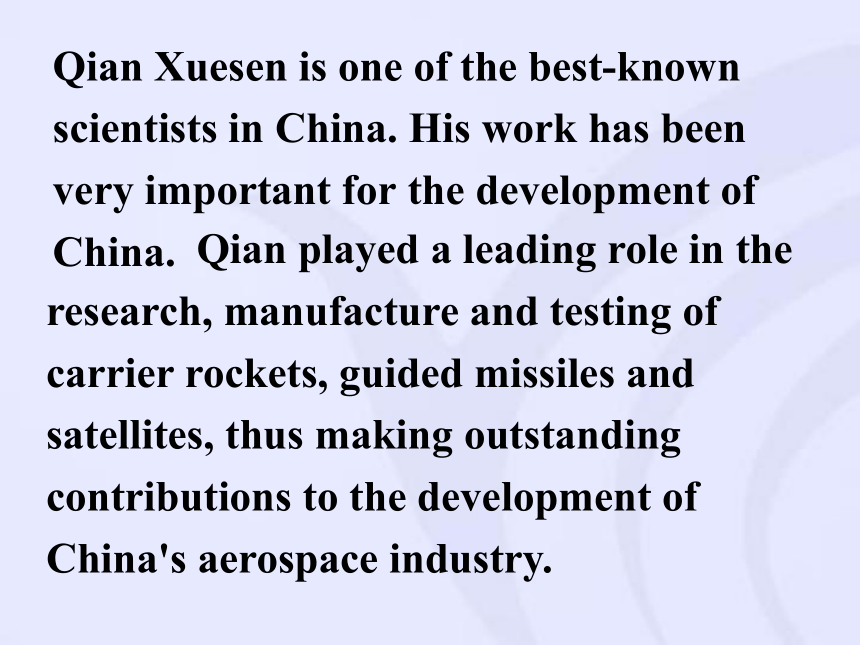
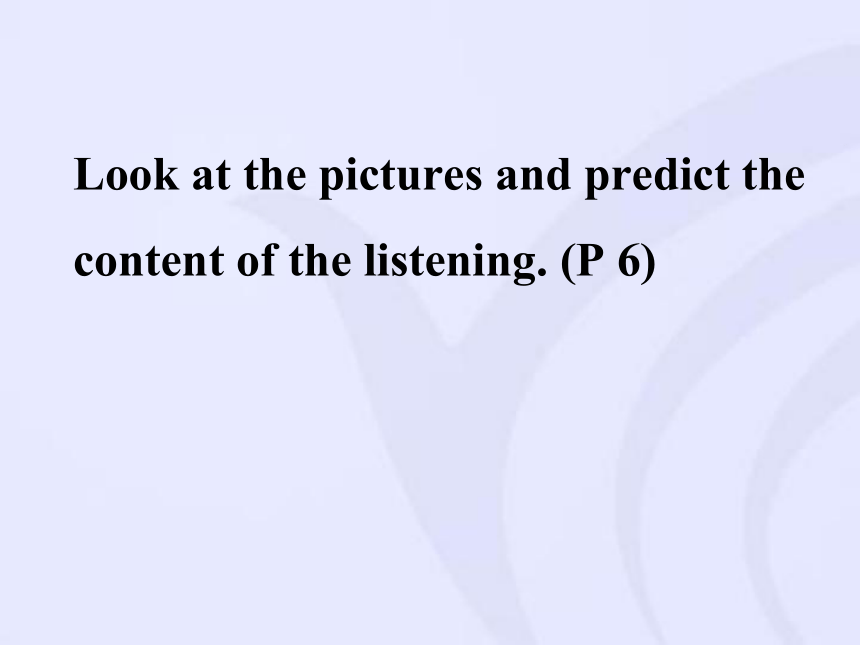

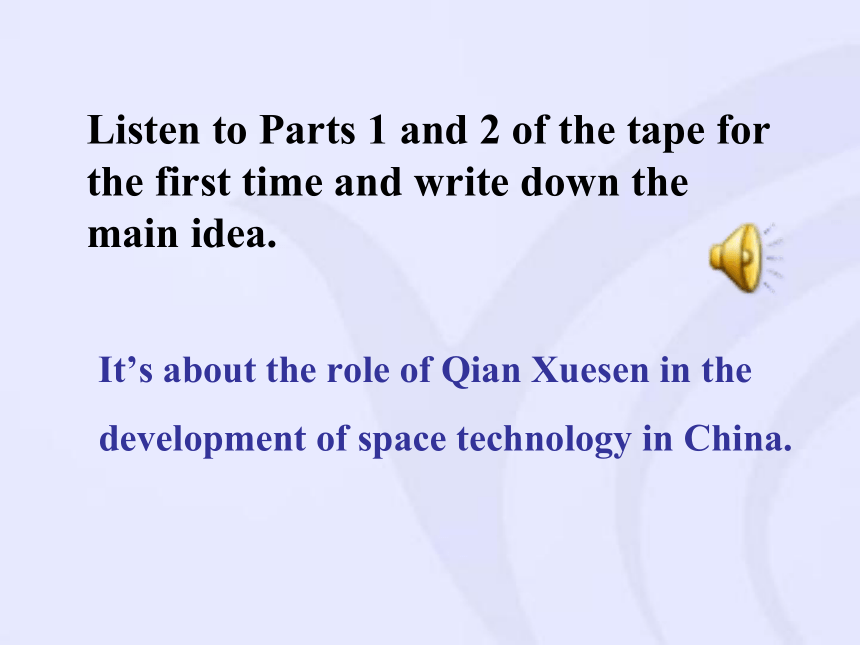
文档简介
(共26张PPT)
Unit 1
Great scientists
Using language
Do you know this old man
Qian XueSen (1911-2009)
Father of China's Aerospace & King of Rockets
Qian Xuesen, a native of Hangzhou, Zhejiang Province, went to the United States to study in 1935. In 1955 he returned to China, and in 1958 he joined the Communist Party.
How much do you know about Qian Xuesen
Qian Xuesen is one of the best-known
scientists in China. His work has been
very important for the development of
China.
Qian played a leading role in the
research, manufacture and testing of
carrier rockets, guided missiles and
satellites, thus making outstanding
contributions to the development of
China's aerospace industry.
Look at the pictures and predict the
content of the listening. (P 6)
Shenzhou-V
It’s about the role of Qian Xuesen in the development of space technology in China.
Listen to Parts 1 and 2 of the tape for the first time and write down the main idea.
1. What did Qian study first
Listen to Part 1 again and answer these
questions.
2. What experience did he get in America that was useful for China
In America he began to work on space rockets so that he was able to develop a space program when he came back to China.
3. What was Qian Xuesen’s main achievement when he returned to China
Qian Xuesen first studied to be an engineer.
When Qian Xuesen returned to China, he set up a Space Institute to begin training people in how to design and build rockets.
Listen to Part 2 and fill in the chart below.
China’s achievements in space Steve Smith’s ambitions
Chinese astronauts in space
Chinese satellites in space
Become a rocket scientist
Be the first to land on Mars and put Qian Xuesen’s pictures there
In groups discuss a scientific job you might choose in the future.
What is its necessary qualifications
Does it need any experience
What is it expected
How do you feel about it
S1: What do you want to do when you
grow up
S2: I want to build robots. I will have to
do a physics and mathematics degree
in China.
Sample conversation
After that I hope to go abroad to
Reading University in England
where you can study all about
robots. There is a special
cybernetics(控制论) department
there.
S1: Why will personality be needed for
that job
S2: They have a lot of uses: for
example, in making cars on a
production line or doing other
repetitive jobs.
S1: What personality will be needed
for that job
S2: I think I need to be patient for my
ideas will take a long time to
develop. I also need to be creative
enough to have good ideas.
S1: What experience will be most
useful to you
S2: I think technology and
engineering projects. I hope to
work in a factory in my holidays.
S1: What kind of person makes a good
inventor
S2: I think someone who is happy to
persevere at something and learns
from his mistakes.
S1: Thank you. I think designing robots
sounds fun.
Listening (P 41)
Carl Linnaeus (1707 – 1778) is known as the father of modern taxonomy, and is also considered one of the fathers of modern ecology.
Robert Briggs is telling his friend Zhang Wei some exciting news.
What is the listening passage is about
This is about a man who finds a flower and wants to know if it is a new species of flower.
Listen again and answer the questions.
If Robert Briggs finds the flower in the book, what does that mean
How would he know if his lily is a new species
It means that his flower has already been identified and has a name.
He would know by checking his lily against other lilies in the specialist book. If his lily is different, it will be a new species.
3. Why do plants all have two names
All plants have two names just like people. The first is the group of flowers they belong to and is like the family name. The second is the kind of flower within that group and is like a given / personal name.
Before Linnaeus here was no way of finding out whether a plant was new or not. This caused problems because different scientists claimed that they had found and named flowers first. After he organized his system it was easy to discover whether a plant was new or not and so who had the right to name it.
4. What was the serious problems for biology
that Linnaeus solved
Listening task (P 44)
Do you know this man
Leonhard Euler (1707 – 1783) was a pioneering Swiss mathematician and physicist.
Listen and fill in the chart.
Euler’s new branch of mathematics
Why Euler is considered to be a great mathematician
topology
1. Introduced many new symbols into maths
2. Wrote more books than anyone before or since
3. Discovered a new branch of mathematics
Go on with your discussion after class with your classmates.
Finish Speaking Task on page 46 and present it the next class.
Unit 1
Great scientists
Using language
Do you know this old man
Qian XueSen (1911-2009)
Father of China's Aerospace & King of Rockets
Qian Xuesen, a native of Hangzhou, Zhejiang Province, went to the United States to study in 1935. In 1955 he returned to China, and in 1958 he joined the Communist Party.
How much do you know about Qian Xuesen
Qian Xuesen is one of the best-known
scientists in China. His work has been
very important for the development of
China.
Qian played a leading role in the
research, manufacture and testing of
carrier rockets, guided missiles and
satellites, thus making outstanding
contributions to the development of
China's aerospace industry.
Look at the pictures and predict the
content of the listening. (P 6)
Shenzhou-V
It’s about the role of Qian Xuesen in the development of space technology in China.
Listen to Parts 1 and 2 of the tape for the first time and write down the main idea.
1. What did Qian study first
Listen to Part 1 again and answer these
questions.
2. What experience did he get in America that was useful for China
In America he began to work on space rockets so that he was able to develop a space program when he came back to China.
3. What was Qian Xuesen’s main achievement when he returned to China
Qian Xuesen first studied to be an engineer.
When Qian Xuesen returned to China, he set up a Space Institute to begin training people in how to design and build rockets.
Listen to Part 2 and fill in the chart below.
China’s achievements in space Steve Smith’s ambitions
Chinese astronauts in space
Chinese satellites in space
Become a rocket scientist
Be the first to land on Mars and put Qian Xuesen’s pictures there
In groups discuss a scientific job you might choose in the future.
What is its necessary qualifications
Does it need any experience
What is it expected
How do you feel about it
S1: What do you want to do when you
grow up
S2: I want to build robots. I will have to
do a physics and mathematics degree
in China.
Sample conversation
After that I hope to go abroad to
Reading University in England
where you can study all about
robots. There is a special
cybernetics(控制论) department
there.
S1: Why will personality be needed for
that job
S2: They have a lot of uses: for
example, in making cars on a
production line or doing other
repetitive jobs.
S1: What personality will be needed
for that job
S2: I think I need to be patient for my
ideas will take a long time to
develop. I also need to be creative
enough to have good ideas.
S1: What experience will be most
useful to you
S2: I think technology and
engineering projects. I hope to
work in a factory in my holidays.
S1: What kind of person makes a good
inventor
S2: I think someone who is happy to
persevere at something and learns
from his mistakes.
S1: Thank you. I think designing robots
sounds fun.
Listening (P 41)
Carl Linnaeus (1707 – 1778) is known as the father of modern taxonomy, and is also considered one of the fathers of modern ecology.
Robert Briggs is telling his friend Zhang Wei some exciting news.
What is the listening passage is about
This is about a man who finds a flower and wants to know if it is a new species of flower.
Listen again and answer the questions.
If Robert Briggs finds the flower in the book, what does that mean
How would he know if his lily is a new species
It means that his flower has already been identified and has a name.
He would know by checking his lily against other lilies in the specialist book. If his lily is different, it will be a new species.
3. Why do plants all have two names
All plants have two names just like people. The first is the group of flowers they belong to and is like the family name. The second is the kind of flower within that group and is like a given / personal name.
Before Linnaeus here was no way of finding out whether a plant was new or not. This caused problems because different scientists claimed that they had found and named flowers first. After he organized his system it was easy to discover whether a plant was new or not and so who had the right to name it.
4. What was the serious problems for biology
that Linnaeus solved
Listening task (P 44)
Do you know this man
Leonhard Euler (1707 – 1783) was a pioneering Swiss mathematician and physicist.
Listen and fill in the chart.
Euler’s new branch of mathematics
Why Euler is considered to be a great mathematician
topology
1. Introduced many new symbols into maths
2. Wrote more books than anyone before or since
3. Discovered a new branch of mathematics
Go on with your discussion after class with your classmates.
Finish Speaking Task on page 46 and present it the next class.
